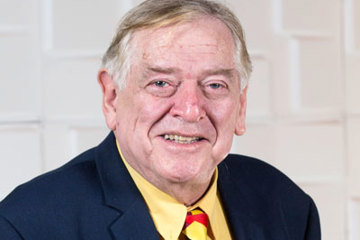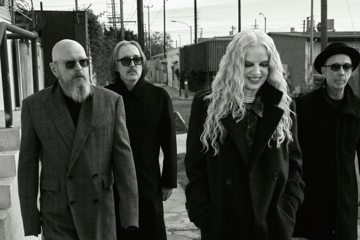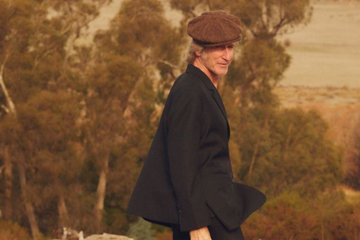Gareth Liddiard Interviews Don Walker [Part One]
"I really appreciate you doing this. And it’s a little bit weird for both of us. Lets just make each other comfortable."

Gareth Liddiard: I've got you on speaker phone because I'm recording it. Is that alright?
Don Walker: Yeah, I'm just sitting in the car.
GL: You're always in a car.
DW: Ahhhm, not always [laughs], I don't sleep here but I'm getting there
Don't miss a beat with our FREE daily newsletter
GL: Are you a grandfather yet?
DW: I'm a grandfather for the second time as of this morning at 9.45.
GL: Wow, cool, congratulations.
DW: Thank you. A little girl… This is the first granddaughter.
GL: Where do we start? This is the first time I've ever interviewed anybody, so… beware.
DW: I really appreciate you doing this. And it's a little bit weird for both of us. Lets just make each other comfortable. [laughs]
GL: Yeah, I've got to warm it up…we'll get to the new album pretty soon. Anyway, I think what you've done has endured so long because, when you're writing songs or creating stuff it's all about ideas and the value of a good idea kind of lies in how useful it is. Your songs have endured, your reputation and your career, I think mainly because the songs give people a lot of consolation. They've been useful. Do you get that from other people's music? A kind of consoling thing?
DW: Sometimes there's consolation for me. As you know, when you're writing it's got nothing to do with 'out there'. It's got nothing to do with the idea that anybody might hear it. It's completely divorced. I mean some of my early songs that are now the most well-known songs were written in a situation where there was no possibility that they would ever be recorded and that's what they were written for. They were written for my own amusement on a nothing day.
GL: Your best stuff, though this isn't necessarily true of your new album, you've got a new slant – but, I mean, all your best songs from before always of reminded me of – or not reminded me – they were like the aftermath of some nasty event. Cheap Wine is kind of like this blackly funny thing about a guy who's just totally fucked up – something in his past has gone wrong and now he's living the way he's living. Or there's Flame Trees – coming from the point of view of someone in the wake of a tragedy of some sort. In all the big hits, like Saturday Night or Choir Girl , there's a sense of getting on with life after loss – Barlow and Chambers is different in that there'll be no getting on with it for them yet it's kind of a debrief for the people who were shocked at what happened to them. It's looking back, it's like your Slim Dusty song – “Lookin' forward, lookin' back” – although he puts it more cheery angle on it. It's almost as though, the best bits of what you have done have been a debrief for everybody and it helps them accept that they're fucked up too.
DW: I can't argue with that, when you lay it out like that, it sounds true. I've never thought of that before. All the songs you've mentioned, they're talking about something that happened in the past of the song. They're trying to connect with or make sense of that. Not even make sense, it's very seldom you try and make sense of anything.
GL: Yeah, I'd be the same writing songs as well. But somehow the best songs seem to do that automatically. To write songs, I think you need a bit of empathy with people, you need to care. But when you started out, you were doing quantum mechanics or weapons research or something like that.
DW: That's what I was qualified for and then I worked for a couple years in a situation where I wasn't using that. I was using general physics skills to try pretend to be a aeronautical engineer. But that wasn't real life, that was just what I was studying and doing for a living. Real life was more – to tell you the truth, it wasn't just a job – I was playing or rehearsing with the other guys until two o'clock and then catching a post-dawn bus out to work and research and going to slep under the desk or reading a science fiction book under there. Meanwhile our military aircrafts were falling out of the sky. [laughs]
GL: You were working F1-11s weren't you?
DW: I was working/modeling on an arcane little, detailed F1-11 aircraft.
GL: Anyway, let's get on to the new album Hully Gully. I really like the album – there's nothing about it I don't like. I've been pretty much listening to it non-stop. It's really, really, really good.
DW: Oh, good. Compared to what you do which has much more of the hot lava of youth– it's a lot sparser and possibly more careful. But that's what happens when you get older I guess. I wasn't sure if you'd like it.
GL: Yeah, I mean that happens to a lot of people. It's amazing. It kind of reminds me of – coming from the opposite side of the planet – it reminds me of, you know, Guy Clark?
DW: You're not the first person who's said that, and no I don't know Guy Clark. [laughs]
GL: Really? You've never heard of Guy Clark?
DW: No, I know, vaguely, who Guy Clark is and where he fits in and it's somewhere, something to do with the Flying Burrito Brothers but I never really got into that world.
GL: That's good because you're doing it your own way.
DW: Maybe I'm wrong. He is connected to the Flying Burrito Brothers, isn't he?
GL: I don't think so, no. I think he's, you know, Townes Van Zandt and all that Texas crew.
DW: Okay, there you go.
GL: He has a crystal clear way of writing about things that is reminiscent of what you do. It's not the same but it's reminiscent. But anyway, back to what we were talking about – you're saying the hot lava of youth and all that, as musicians get older they usually get blander, you know what I mean? They lose a fire. They lose what I would call, the transgression, in their songwriting and performing – they don't fuck shit up anymore, they don't convey uncomfortable truths or weird ideas or viewpoints anymore or in their lyrics. And the musicians behind them don't really fuck stuff up. I mean, you know your song Angry Woman – that's amazing, that's full of transgression – I mean, in the sense of the Sex Pistols. Bob Dylan was the same thing because he came up with all these new, strange left of field, ideas which sort of make your ears prick up – how come you haven't just blanded out?
DW: Well, something like Angry Women was enormous fun to write and it's always enormous fun to perform and people who laugh the most at it are the women. The guys aren't game. But I think there's the whole point, I became a musician and I assume you became a musician – well, for me I was working in a job that resembled the post-office and I didn't want to do that. I wanted to do something that was fun everyday, where I could play with stuff in my head and have fun. What's the point of then doing that and then making it like a post-office job again?
GL: That makes sense.
DW: I mean, you're going to places where anybody is having any commercial success like Nashville and places like that and it really is what they're doing – it really is like a post-office job. And that's what it sounds like. But mind you, they're selling a lot of records – I'm not.
GL: True, true. I know that feeling. Talking about Nashville and that part of the world, you got mixed by Joe Henry?
DW: Yes, that's right.
GL: He's a weird guy. He does that kind of, what he's known for – the rootsy thing – but I mean he's worked with Madonna, Marc Ribot, Ornette Coleman – who's one of my favourite jazz guys, Timbaland – who's one of my favourite modern RnB guys, he's worked with Spinal Tap, that's pretty cool. How did you get on to him?
DW: Well, I fell in love with the Allen Toussaint record he did a about two or three years ago, Bright Mississippi. That was in my car for about six months and I vaguely knew about Joe before that but listening to that, to me, it sounded like Duke Ellington produced by Jimmy Page and I could hear Ellington right through it. I just fell in love with the record and I still don't know a lot about Joe in his capacity other than in production. I know people who are big fans of Joe as a singer/songwriter but don't know that much about his production. I expressed a joking interest one day to somebody that wouldn't it be good to get Joe Henry to mix this, and it so happened that somebody knew his manager and next minute I have Joe on the email saying would you like to send me some songs? And I sent him three songs and he liked it. He liked it enough to get interested in mixing it.
GL: And you haven't made a solo album since… I mean, the last release of yours – there was the Chisel thing, and then was it the Tex, Don and Charlie thing in the mid-2000s?
DW: Last Tex, Don and Charlie was in 2005, and then I released a solo album, Cutting Back, in 2006.
GL: I've seen you play a bunch of times in the interim and you've played most of the songs of Hully Gully. When you write a tune, do you just spit them out and they're a done deal or do you sit on them for ages and work them through.
DW: Once the band learns them, the writing's finished. And often they're sitting around written before I'll decide – for no reason at all – I might teach this one to the band and see how it works up. So there's a bunch written at that stage now. The last thing the band learnt was Fishing last year maybe and I've just been too flat-out to bring any more songs to them. So, there are now no unreleased songs in the set but there's quite a few ready for them to learn and there's few new ones I'll be taking to them before we get to Melbourne at the end of November. I don't want to go down there and play the same thing people heard last year.
GL: You don't ever do that thing – like people like Bob Dylan do – where, like you said once the song reaches the band then it's set in stone. Do you ever change them afterwards? I mean, Bob Dylan would do that thing where he'd change whole verses and stuff years after the album came out.
DW: Not consciously. And by that, I mean there have been things where I record some of these songs and then it comes to that day where you have to sit and actually do liner notes, you know. So, you go to grab the lyrics which are in a file somewhere that dates back to when the song was first written and often find that the lyrics have changed and evolved just in performance. Not to a great extent just in little details here and there.







